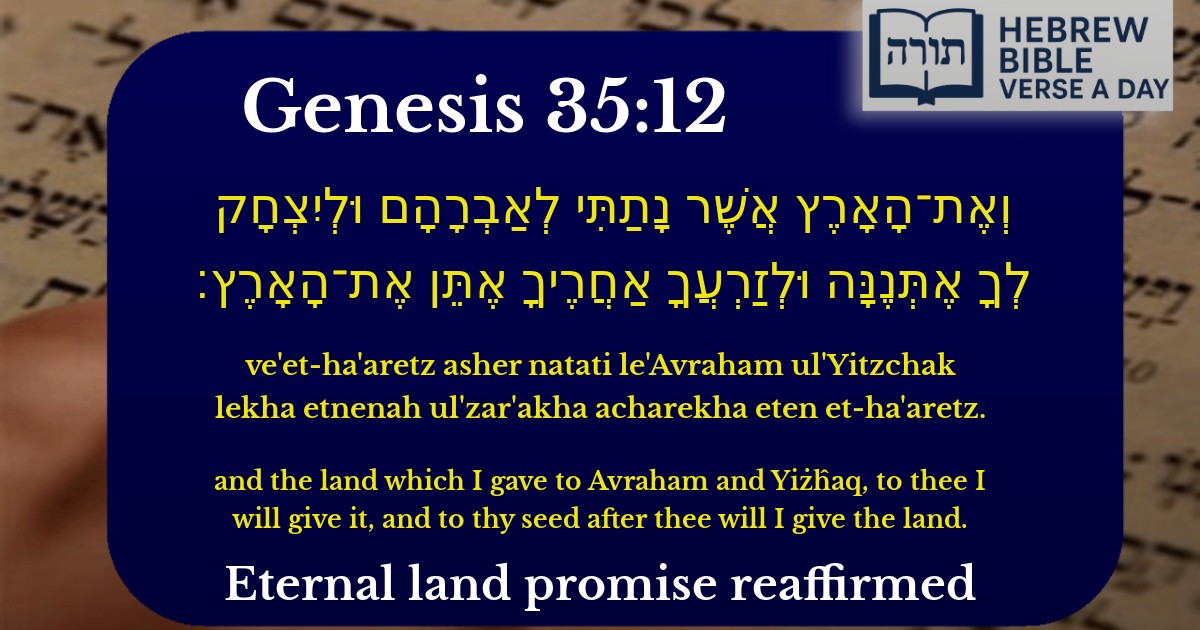Join Our Newsletter To Be Informed When New Videos Are Posted
Join the thousands of fellow Studends who rely on our videos to learn how to read the bible in Hebrew for free!
Hebrew Text
וְאֶת־הָאָרֶץ אֲשֶׁר נָתַתִּי לְאַבְרָהָם וּלְיִצְחָק לְךָ אֶתְּנֶנָּה וּלְזַרְעֲךָ אַחֲרֶיךָ אֶתֵּן אֶת־הָאָרֶץ׃
English Translation
and the land which I gave to Avraham and Yiżĥaq, to thee I will give it, and to thy seed after thee will I give the land.
Transliteration
Ve'et-ha'aretz asher natati le'Avraham ul'Yitzchak lekha etnenah ul'zar'akha acharekha eten et-ha'aretz.
Hebrew Leining Text
וְאֶת־הָאָ֗רֶץ אֲשֶׁ֥ר נָתַ֛תִּי לְאַבְרָהָ֥ם וּלְיִצְחָ֖ק לְךָ֣ אֶתְּנֶ֑נָּה וּֽלְזַרְעֲךָ֥ אַחֲרֶ֖יךָ אֶתֵּ֥ן אֶת־הָאָֽרֶץ׃
וְאֶת־הָאָ֗רֶץ אֲשֶׁ֥ר נָתַ֛תִּי לְאַבְרָהָ֥ם וּלְיִצְחָ֖ק לְךָ֣ אֶתְּנֶ֑נָּה וּֽלְזַרְעֲךָ֥ אַחֲרֶ֖יךָ אֶתֵּ֥ן אֶת־הָאָֽרֶץ׃
🎵 Listen to leining
Parasha Commentary
📚 Talmud Citations
This verse is quoted in the Talmud.
📖 Berakhot 7a
The verse is referenced in a discussion about the merits of the patriarchs and God's promises to them.
📖 Sanhedrin 90b
Cited in a discussion about the resurrection of the dead and the inheritance of the land of Israel.
📖 Megillah 14a
Mentioned in the context of discussing the divine promises to the patriarchs and their fulfillment.


Promise of the Land to Yaakov and His Descendants
The verse (Bereshit 35:12) reaffirms Hashem's covenant with Yaakov, echoing the promises made to Avraham and Yitzchak. Rashi explains that this repetition emphasizes the eternal nature of the Divine promise—the land is given not only to Yaakov but also to his descendants for all generations. The Ramban adds that this assurance was particularly significant during Yaakov's time of distress, reinforcing that his struggles would culminate in the fulfillment of this inheritance.
Inheritance Through Merit and Covenant
The Talmud (Ketubot 110b) teaches that dwelling in Eretz Yisrael is equivalent to observing all the mitzvot, highlighting the land's spiritual centrality. The Midrash (Bereshit Rabbah 46:9) notes that the phrase "to you I will give it" underscores Yaakov's personal merit, while "to your seed after you" extends the promise conditionally—dependent on his descendants' adherence to Torah. The Sforno clarifies that the dual phrasing ("to you" and "to your seed") ensures the land remains an eternal inheritance, inseparable from the Jewish people.
The Land as a Divine Gift